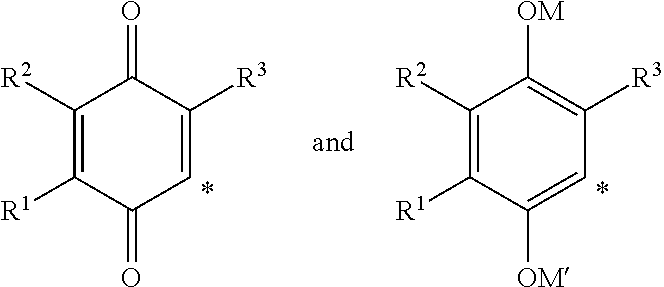2-heterocyclylaminoalkyl-(p-quinone) derivatives for treatment of oxidative stress diseases
a technology of cyclocycloalkyl and derivatives, which is applied in the direction of drug compositions, antinoxious agents, metabolic disorders, etc., can solve the problems of oxidative damage to the cellular structure and machinery, cell damage and cell death, and the rate of damage to the cell membrane exceeds the capacity of the system which controls or repairs, so as to improve the health of the patient and raise the level of atp in the individual
- Summary
- Abstract
- Description
- Claims
- Application Information
AI Technical Summary
Benefits of technology
Problems solved by technology
Method used
Image
Examples
example 1
2,3,5-Trimethyl-6-(2-(4-(trifluoromethyl)pyridin-2-ylamino)ethyl)cyclohexa-2,5-diene-1,4-dione
Step 1: 1,4-Bis(benzyloxy)-3,5,6-trimethylbenzene
[0225]A solution of 2,3,5-trimethylhydroquinone (15.2 g, 100 mmol) in DMF (150 mL) was treated with BnBr (35.7 mL, 51.6 g, 300 mmol, 3 equiv.) and anhydrous K2CO3 (55.3 g, 400 mmol, 4 equiv.). The brown suspension was heated to 60° C. for 48 h at which time the reaction was judged incomplete by HPLC. Additional BnBr (37 mL, 300 mmol, 3 equiv.) and K2CO3 (50 g, 362 mmol, 3.6 equiv.) were added and heated to 60° C. for an additional 48 h. The reaction was cooled, filtered through Celite, the filter cake rinsed 2×100 mL EtOAc and the combined filtrates washed with 500 mL H2O. The aqueous layer was extracted 4×250 mL EtOAc and concentrated at 80° C. by rotary evaporation. The brown residue was poured onto 300 mL water which precipitated a light brown solid and the resulting suspension stirred overnight. The brown solid was collected by filtration...
example a
Screening Compounds of the Invention in Human Dermal Fibroblasts from Friedreich's Ataxia Patients
[0239]An initial screen was performed to identify compounds effective for the amelioration of redox disorders. Test samples, 4 reference compounds (idebenone, decylubiquinone, Trolox and α-tocopherol acetate), and solvent controls were tested for their ability to rescue FRDA fibroblasts stressed by addition of L-buthionine-(S,R)-sulfoximine (BSO), as described in Jauslin et al., Hum. Mol. Genet. 11(24):3055 (2002), Jauslin et al., FASEB J. 17:1972-4 (2003), and International Patent Application WO 2004 / 003565. Human dermal fibroblasts from Friedreich's Ataxia patients have been shown to be hypersensitive to inhibition of the de novo synthesis of glutathione (GSH) with L-buthionine-(S,R)-sulfoximine (BSO), a specific inhibitor of GSH synthetase (Jauslin et al., Hum. Mol. Genet. 11(24):3055 (2002)). This specific BSO-mediated cell death can be prevented by administration of antioxidants or...
example b
Screening Compounds of the Invention in Fibroblasts from Huntington's Patients
[0259]Compounds of the invention were tested using a screen similar to the one described in Example A, but substituting FRDA cells with Huntington's cells obtained from the Coriell Cell Repositories (Camden, N.J.; repository number GM 04281). The compounds were tested for their ability to rescue human dermal fibroblasts from Huntington's patients from oxidative stress.
[0260]Certain compounds of the present invention such as:[0261]2,3,5-trimethyl-6-(2-(pyrimidin-2-ylamino)ethyl)cyclohexa-2,5-diene-1,4-dione;[0262]2,3,5-trimethyl-6-(2-(pyridin-2-ylamino)ethyl)cyclohexa-2,5-diene-1,4-dione;[0263]2,3,5-trimethyl-6-(2-(4-(trifluoromethyl)pyrimidin-2-ylamino)ethyl)cyclohexa-2,5-diene-1,4-dione;[0264]2,3,5-trimethyl-6-(2-(4-(trifluoromethyl)pyridin-2-ylamino)ethyl)cyclohexa-2,5-diene-1,4-dione;[0265]2,3,5-trimethyl-6-(2-(5-(trifluoromethyl)pyridin-2-ylamino)ethyl)cyclohexa-2,5-diene-1,4-dione;[0266]2,3,5-tri meth...
PUM
 Login to View More
Login to View More Abstract
Description
Claims
Application Information
 Login to View More
Login to View More - R&D
- Intellectual Property
- Life Sciences
- Materials
- Tech Scout
- Unparalleled Data Quality
- Higher Quality Content
- 60% Fewer Hallucinations
Browse by: Latest US Patents, China's latest patents, Technical Efficacy Thesaurus, Application Domain, Technology Topic, Popular Technical Reports.
© 2025 PatSnap. All rights reserved.Legal|Privacy policy|Modern Slavery Act Transparency Statement|Sitemap|About US| Contact US: help@patsnap.com



